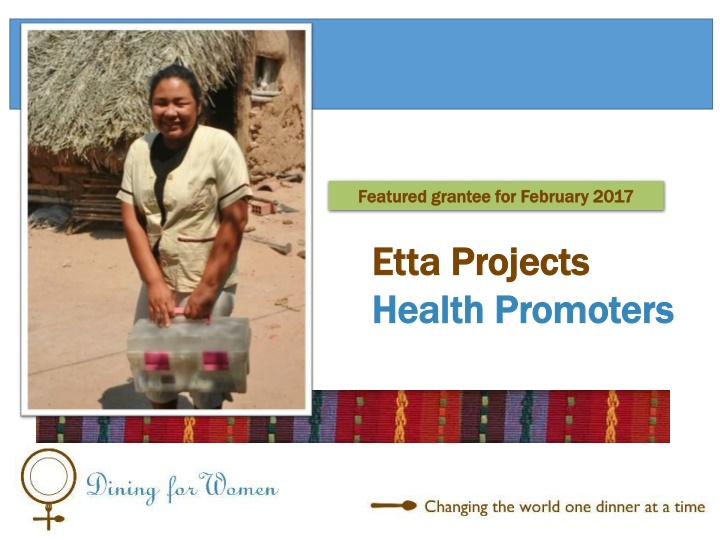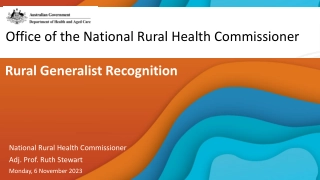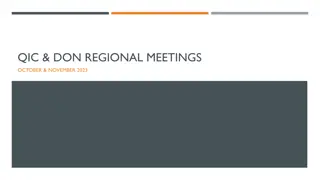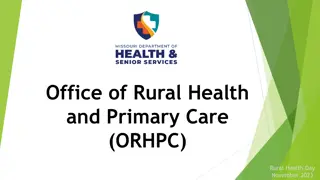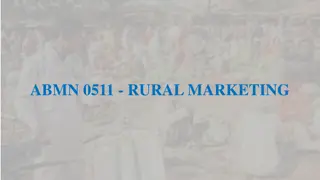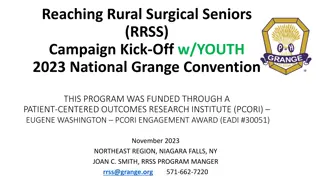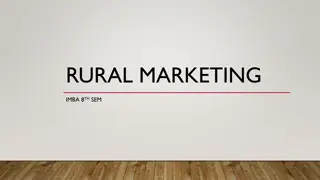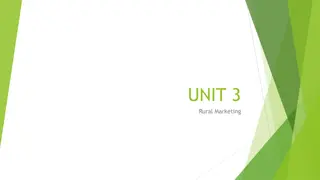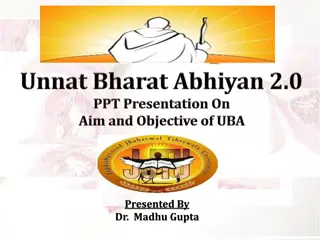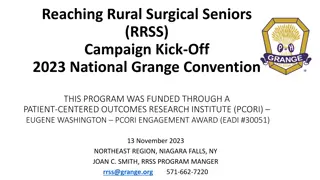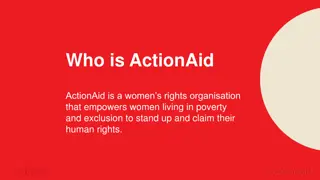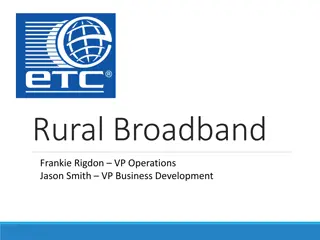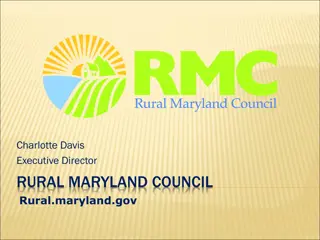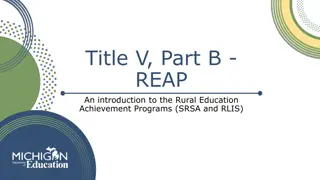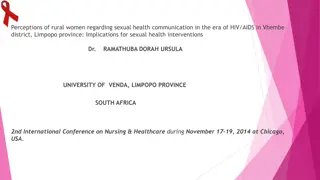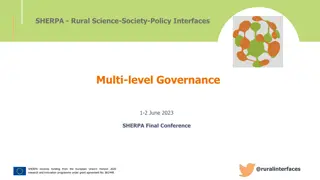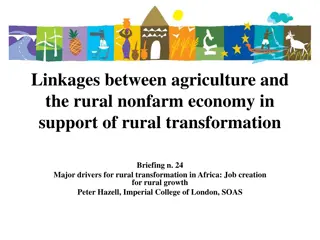Improving Health and Empowering Women in Rural Bolivia
Etta Projects collaborates with communities in rural eastern Bolivia to address health challenges, sanitation issues, and clean water access. The initiative focuses on training Health Promoters, enhancing educational opportunities for women, and reducing violence against women and girls. Learn about the life challenges faced by women in Bolivia and how Dining for Women's grant supports these crucial initiatives.
Download Presentation

Please find below an Image/Link to download the presentation.
The content on the website is provided AS IS for your information and personal use only. It may not be sold, licensed, or shared on other websites without obtaining consent from the author.If you encounter any issues during the download, it is possible that the publisher has removed the file from their server.
You are allowed to download the files provided on this website for personal or commercial use, subject to the condition that they are used lawfully. All files are the property of their respective owners.
The content on the website is provided AS IS for your information and personal use only. It may not be sold, licensed, or shared on other websites without obtaining consent from the author.
E N D
Presentation Transcript
Featured grantee for February 2017 Featured grantee for February 2017 Etta Projects Etta Projects Health Promoters Health Promoters
Introducing Introducing Etta Projects Etta Projects Etta Projects collaborates with communities, creating sustainable solutions to improve health, sanitation and clean water. February 2017
Where in the world? Where in the world? Etta Projects serves women and families in rural eastern Bolivia, the poorest country in South America, ranked at or near the bottom for education, nutrition, and life expectancy. A high-altitude, landlocked country, it is three times the size of Montana and borders Argentina, Brazil, Chile, Paraguay and Peru. Flooding typically occurs in March and April, which can spread human waste from open-pit latrines, used by 90 percent of the population. February 2017
What are we supporting? What are we supporting? DFW s donation of $39,825 will pay for the second year of Health Promoter (HP) training program for 50 villagers (95 percent are women). The program increases educational opportunities and leadership roles for women, improves village health, and seeks to reduce violence against women and girls. Donations cover materials, supplies, food, transportation and professional support. Beneficiaries: Direct 50, Indirect 5,361 February 2017
Life Challenges of Women in Rural Eastern Bolivia Life Challenges of Women in Rural Eastern Bolivia The women of rural eastern Bolivia endure nonexistent water and sanitation systems, inadequate healthcare, and domestic abuse. Bolivia ranks first in Latin America for violence against women and second for sexual violence. Sexual and reproductive health is a taboo subject. The risk of contracting an infectious disease or other illness is high, yet the healthcare system is often inaccessible due to lack of staff, flooded roads or unreliable transportation. February 2017
Budget Budget How Dining for Women s grant of $39,824.57 will be used over one year: How Dining for Women s grant of $39,824.57 will be used over one year: Item Total Health training manuals; materials for writing, suturing, hygiene and health promotion, sexual health and hygiene; and materials for fairs, events and workshops; Lunch and snacks during 48 workshops and community meetings and food for staff in the field Education materials and supplies $9,019.57 Backpacks, materials for visits to communities and clinics, community health banners and more; Transportation between office and villages, motor cycle, maintenance and gasoline for ambulance Materials for local Health Promoters $6,109 Project facilitator (doctor dedicated to facilitating workshops, meetings and activities) and project director (10 hours per week) Community health kits (scales, blood pressure monitors, stethoscopes, common medicines, emergency supplies and more), health kit replenishment, indigenous health room supplies, Health Promoter continuing education Professional support $14,256 Community health materials $10,440 TOTAL EXPENSES $39,824.57 February 2017 6
About the Featured Grantee About the Featured Grantee Etta Projects was created in 2003 to honor the short life and meaningful legacy of Etta Turner, who died in a bus accident in 2002 while in Bolivia as an exchange student. Etta Projects has enhanced the lives of over 64,500 rural Bolivians by providing improvements to health, water quality, sanitation and education. February 2017
About the Featured Grantee About the Featured Grantee EP offers rural Bolivians education and training. Over 100 community leaders, 95 percent women, have become Health Promoters, serving in 19 communities. They possess the tools, skills and knowledge to serve more than 7,500 people. These women become leaders as they provide health services and educate their communities on disease prevention, family planning, nutrition, child and adolescent health, and indigenous herbal medicine. EP has also created one of Bolivia s first Domestic Violence Prevention programs. February 2017
February 2017 Sustained Program: February 2017 Sustained Program: Starfish Starfish Starfish (formerly Starfish One by One) provides a holistic approach to education for indigenous, adolescent Guatemalan girls. Through peer support and mentorship, these young women become leaders, breaking the cycle of poverty and exclusion and transforming their families, communities and country. The sustained grant of $20,000 per year in 2016 2018 supports an all-girl flagship school to empower and educate a generation of female leaders in rural Guatemala. February 2017 9
Share Your Thoughts Share Your Thoughts 1. Why is it important for Bolivia s indigenous populations to have a voice in medical treatment? 2. How might this program change rural Bolivian society? 3. How could the role of Health Promoters influence attitudes about violence against women? January 2015
